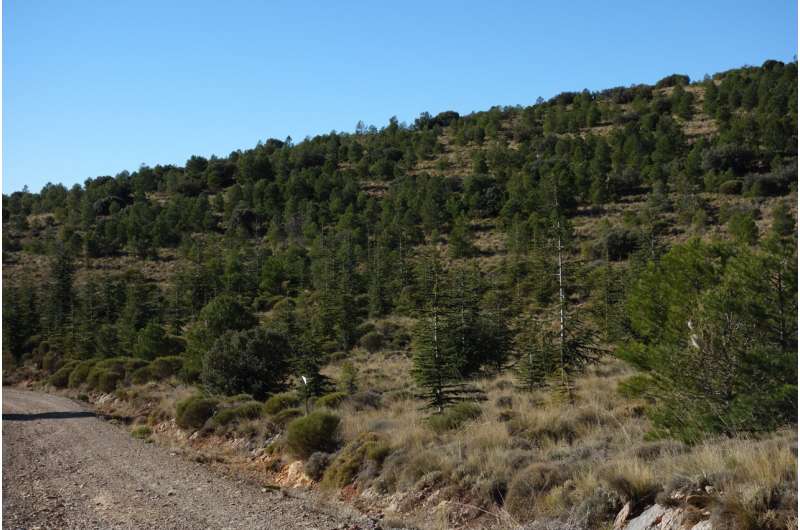Atlas cedar as an alternative to mitigate the effects of climate change in forests on the Iberian Peninsula

A study carried out by an international team and published in a special issue of the journal Forests on adaptive forestry analyzed the usefulness of the Atlas cedar, a North African species, in mitigating the effects of climate change in the forest systems of the Iberian Peninsula's Mediterranean Arc.
The Atlas cedar, or Cedrus atlantica (Endl. Manetti ex Carrière)is a species that belongs to Mediterranean mountain conifers, and is found in North Africa (Morocco and Algeria). Although this is geographically close to the Iberian Peninsula, it can still be considered an exotic species in Spain, as paleobotanical records do not confirm its natural presence. As a foreign species, it has been principally used for landscaping in forest repopulation efforts, especially in Andalusia.
The presence of the species in numerous repopulations, as explained by Rafael María Navarro Cerrillo, a professor at the Department of Forestry Engineering of the UCO and a specialist in adaptive forestry, "provides us with an experimental device to study the adaptation of an exotic species in the Iberian Peninsula , but one from much more arid ecosystems," as this is "a species with the potential to replace other Mediterranean conifers in the southern Iberian Peninsula affected by climate change."
Without a doubt, the effects of climate change are already evident: a higher incidence of major forest fires, changes in the phenology of trees, a greater presence of diseases and pests, as well as difficulty responding to climatic disturbances. As a result, forests' resilience is decreasing. While forests used to have 100 or 200 years to regenerate after a major fire, today that time window, due to the accelerated nature of climate change, has decreased, and their resilience capacity is altered.
To mitigate the effects of climate change, adaptive forestry develops a set of measures to reduce the vulnerability of forest systems and increase their capacity for resistance and resilience. To this end, a series of actions are proposed, such as the regulation of the thickness of forests (which would allow for a better use of resources), the creation of landscapes adapted to fire (through the incorporation of species that are more fire-resistant), assisted migration (allowing species to reach areas that in the future will be able to withstand climate change, but that, given its speed, do not have time to do so without any intervention), and the improvement of biodiversity in situations of environmental stress.
The debate on the advisability of spreading exotic species aside, forcing the migration of species or genotypes that are better adapted to climate change conditions through assisted migration, and as a substitute, is an option offered by adaptive forestry, and exemplified in the atlas cedar.
A study conducted by the Pyrenean Institute of Ecology, featuring collaboration by the University of Córdoba and published in the journal Forests, studiedeight plantations of the Atlas cedar located along a sweeping geographic, climatic and altitudinal gradient, from wetter sites in southeastern France and northern Spain to dry sites in southeastern Spain. It found that the Atlas cedar responds in a way very similar to that of other mountain conifers, dependent on rainfall in the winter and snow, so "it is a species very well adapted to these mountain conditions and with the capacity to replace other species that are more sensitive to climate change in many of the high mountain regions of the Mediterranean, especially in Andalusia," stated Navarro Cerrillo, a participant in this research effort.
In short, "if we want to maintain tree structures in Mediterranean mountain conditions at high elevations, and with significant aridity, the Atlas cedar could be an alternative," concludes Navarro Cerrillo.
Networking, key in adaptive forestry
This research study is part of the work carried out by Silvadapt, the Spanish Network for Adaptive Forestry, financed by the Ministry of Science, Innovation and Universities, to deal with the effects of climate change on Spanish forests. The network is made up of 14 institutions, including the University of Córdoba, which have 34 experimental devices for adaptive forestry throughout the entire Spanish Mediterranean Arc, seeking to generate synergies to exchange scientific data, develop new methodologies, coordinate research etc. The network includes different groups focusing on specific aspects, such as carbon, hydrology, resilience, dendrochronology and sensorization.
By including experimental sites in different climatic zones, the results are useful for the entire the Iberian Peninsula, as they are not focused on a specific area. In addition, the network features an international orientation, as it aims to collaborate with adaptive forestry networks in other countries.
More information: Jesús Julio Camarero et al, Shifting Precipitation Patterns Drive Growth Variability and Drought Resilience of European Atlas Cedar Plantations, Forests (2021). DOI: 10.3390/f12121751
Provided by University of Córdoba




















